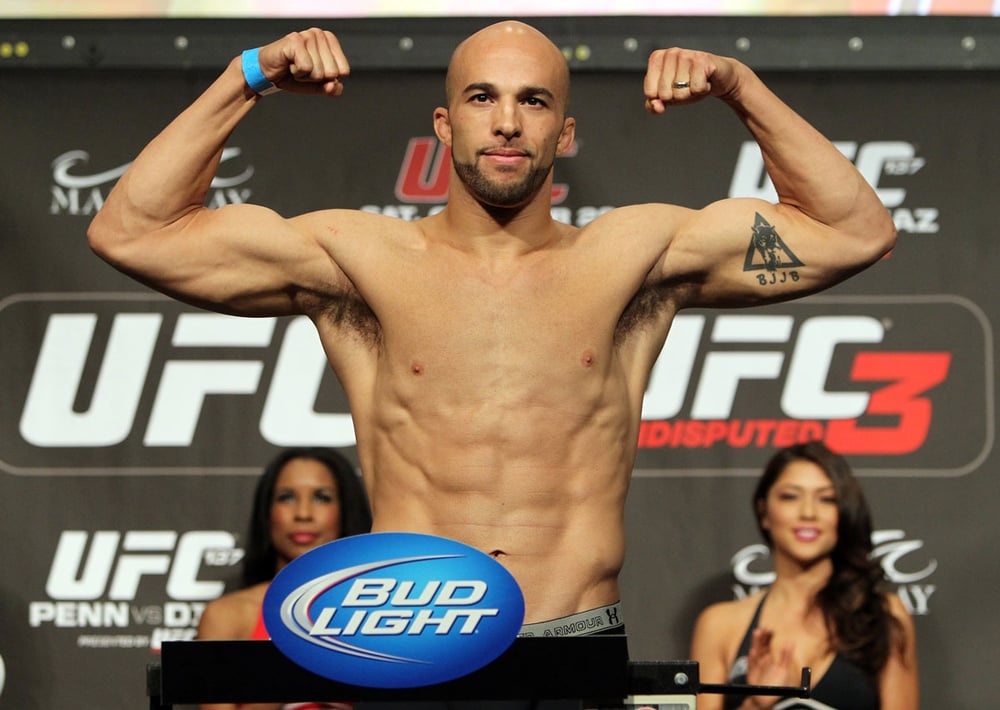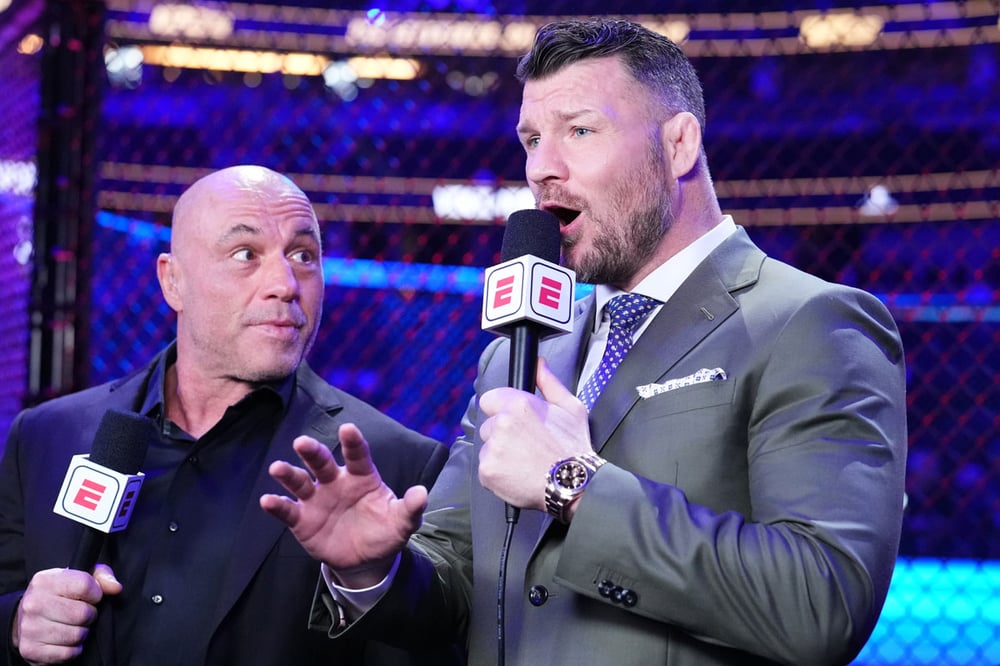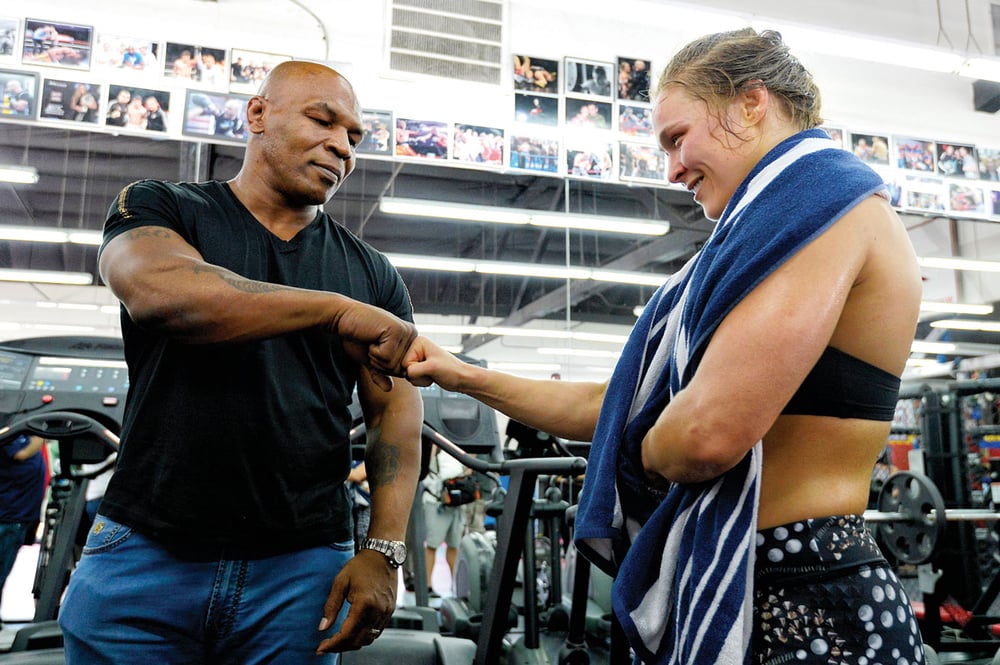
Issue 205
May 2024
Kyle Dimond explores how fans can support their favorite MMA fighters' post-retirement ventures and keep their legacies alive.
There’s a reason why MMA retirements don’t tend to last long. Of course, it’s hard to scratch that same itch when suddenly, an athlete is no longer focused on training and competing every day. At the same time, it’s a daunting task to transition out of a career that has demanded so much from you while you’re in it.
Through the sport's growth and a greater emphasis on planning for the future, former fighters have more options than ever. Along with the career paths deeply embedded within MMA, ex-pros constantly break new ground for what is possible once they lay the gloves for good.
AVENUE NO. 1 - THE TEACHER
There’s no book on how to become a successful fighter in MMA. With that in mind, your best bet is to find someone who has been through it, accumulated knowledge and experience, and can now pass that on. That’s where the most likely career path post-career comes into play for former fighters. If you have the ambition of stepping inside the cage, you will want a coach who has been through that experience. Becoming a coach or gym owner is the most obvious career path. While coaching is undoubtedly a skill that can be developed over time, much of the hard work is done during your career, even if the fighter doesn’t realize it.
Now, of course, many of the top coaches in the sport will be quick to tell you that experience and knowledge alone doesn’t make you a great coach. At the same time, you don’t need to work the corner of world champions to make a living by sharing the life experiences you have picked up along the way. This also goes hand-in-hand with setting up a gym, where your unique selling point as a new business is that it is owned by a former fighter/athlete. There are examples of this all across the sport of fighters turning into coaches and gym owners, from the very pinnacle of MMA to your local martial arts gyms and schools.

For example, not every MMA fan will recognize the name Eliot Marshall. Marshall fought six times in the UFC and was featured in season 8 of The Ultimate Fighter. Of course, getting to the UFC is a feat that only a few fighters will achieve in their careers. However, what he has gone on to do after he was let go by the promotion shows why this career path is the most obvious one to take. Having spent time as the head coach at the highly regarded Elevation Fight Team, Marshall also went on to start his gym, the Easton Training Center. By his admission, he had a lot to learn about business along the way, but as of 2018, he had nine different locations scattered around Colorado.
Marshall spoke about his post-fight career in an interview for Entrepreneur back in 2023. "Did I have any business experience? No," Marshall says. "I punched people in the face for a living, and they punched me back."
"The richest person in the world and the poorest person in the world, both of their biggest assets are time," he says. "So the fact that anybody, any student, any employee, would spend any time doing something with me, I have to look at it as my privilege."
This venture can also lead to several other revenue sources and career options from experience as a former professional athlete and fighter. Former pros can make money by becoming personal trainers/coaching private lessons, recording instructionals and coaching seminars, and using their experience in ways that don’t involve passing it on.
Many fighters use that same life experience and passion for the sport to take on other significant roles, such as referees or judges. When you think of the two most prominent referees in the sport today, Herb Dean and Marc Goddard, both have experience as fighters and have gone on to work as highly regarded officials who now pass this knowledge on to others. Many people also believe that the standard of judging in MMA would increase by having more former fighters transition into the role. While it’s a slow process, former UFC fighters Frank Trigg and Chris Leben have held prominent roles in this field, and that’s just at the top of the sport. The chances are that if you dive deeper into local MMA scenes, you will find former fighters dotted all over the place. As long as the sport has existed, this career path of becoming a coach, gym owner, or another similar role has been embedded.
AVENUE NO. 2 – SHARING THEIR KNOWLEDGE
Away from being physically involved in passing down their knowledge and experience, there are other ways for former fighters to use this once their days of competition are behind them. In the same way that a young fighter would want a coach in their corner who has already been there and done it, who better to commentate on the sport than someone who has real-life experience of it? This has been happening for some time now in the UFC, but it’s a part of the sport across all levels. There’s a reason why the MMA leader will always have at least one former fighter in the broadcast booth for events, whether it’s Daniel Cormier, Michael Bisping, Paul Felder, Dominick Cruz, or Laura Sanko. Not to mention the fighters that do commentary for non-English speaking broadcasts like Brandon Moreno.

However, commentary jobs are not regularly available every week, perhaps unless you work for one of the very top promotions in the sport. Other avenues have opened up that allow fighters to make a career out of talking about the sport rather than doing it. There are analyst roles for promotions and sports networks, but these are relatively limited. It seems that you now see a new YouTube channel or podcast from a current or retired fighter popping up every week or two. For the most part, this means using the platform and fan following that a fighter has built up to take that brand and turn it into something else. Whether it’s commentary, analysis, or content creation, this is another way for fighters to use their careers as the jumpstart to a new venture that didn’t exist when MMA first began to turn heads.
Excelling in any of these roles creates the need to combine their experience and knowledge with another skill. For some, business makes the most sense. Several MMA fighters have gone on to work behind the scenes at promotions or set up shows such as Anthony Pettis’ APFC or Urijah Faber’s A1 Combat. One fighter that effectively ticks all three categories of post-fight career in this section is Dan Hardy. In 2013, “The Outlaw” was diagnosed with Wolff–Parkinson–White syndrome, which forced him, incorrectly following information he later found out, into an early retirement. For many, the path from this point would be to continue working in MMA as a coach or gym owner (which Hardy has also done) or find an entirely new path away from the sport. This wasn’t the case for Hardy, who became a commentator and analyst for the UFC.
His work breaking down fights gave Hardy an excellent reputation as an analytical mind in the sport, meaning that even after he departed the UFC entirely, he applied this same skill set to creating content on YouTube. Now, alongside working as a commentator, the former UFC welterweight works with the PFL, where he is the head of fighter operations for the PFL Europe brand. With his experience of living this sport and his passion for the athletes, Hardy carries out this role in a way only a former fighter could. It’s worth saying that, like the former examples from UFC athletes, it isn’t this simple for most fighters. With more people competing in the sport today than ever before, there’s also more demand for post-fighting careers. Fortunately, you don’t have to transition into a career centered around the sport directly.
AVENUE NO. 3 – BECOMING A BRAND
We are starting to see more fighters build themselves into a brand during their active career, allowing them to make the most of their time in the spotlight. There has always been an emphasis, across all sports, placed on thinking about your future career steps so that you can start moving in that direction towards the tail end of the competition, and this has certainly become a factor in MMA. Sports careers don’t generally last long, and fighting is a young man’s game. Using the platform you have during your career to then set-up foundations going forward is becoming much more common.
Social media plays a big part in this. Whether it’s through promoting products and sponsors as a revenue source or using the platform you have built to bring attention to your ventures. Self-promotion is an integral part of the modern-day sport. With more fighters joining MMA who have grown up with social media, this will only increase. Fans will keep up with a fighter's career via their social media channels, but what happens to that same following once the career is over? It’s still there. Ronda Rousey, for instance, has ventured into the world of professional wrestling and developed her own gaming channel on YouTube, which has 1.74 million subscribers. 
Laughter might not be the first thing you associate with MMA, but transitioning from the octagon to the comedy stage is the perfect next round for some fighters. Take Brendan Schaub, for example. After hanging up his gloves, Schaub found a new calling as a comedian, bringing his unique perspective and sharp wit to audiences. His success in stand-up comedy and podcasting shows that the skills honed in the cage—timing, resilience, and a knack for reading the room—translate surprisingly well to making people laugh. Schaub's journey from fighter to funnyman exemplifies the diverse paths fighters can take after their athletic careers, proving that a fighter's spirit can thrive in many arenas.
AVENUE NO. 4 – THE BUSINESS END OF THINGS
Alongside this are the fighters that invest in ventures like property and other opportunities and then use their brand to build a business. Conor turned Proper No. Twelve whiskey into a household name, paving the way for many of his former rivals to follow. Dustin Poirier has used the spotlight and following that he has gained while being an active fighter to turn his Louisiana Hot Sauce into a business, which will be waiting for him once he hangs up the gloves (alongside brands that he represents or is sponsored by like Bud Light). Crucially, the business, product, and brand don’t revolve around him being an active fighter, so it isn’t going anywhere, which is even more relevant now that he's talking of retirement following a loss to Makhachev. Gorge Masvidal also embraced the business world with his Gamebred FC promotion and Recuerdo Mezcal. Brothers Nick and Nate Diaz ventured into the health and wellness sector with their CBD company, Game Up Nutrition. Keith Jardine, a former UFC fighter known for his unorthodox style, co-owns Caveman Coffee with fellow fighter Tait Fletcher, who has also succeeded in Hollywood as a stuntman and actor. Ronda Rousey has diversified her portfolio with investments in wrestling and a gaming channel on YouTube. Georges St-Pierre has dived into the health and wellness sector with his fitness equipment and training programs. These business ventures provide a lucrative and fulfilling path for fighters looking to channel their competitive drive into new endeavors. Their journeys show that the skills and determination honed in the cage can pave the way for entrepreneurial success, inspiring fans to support their favorite fighters in every venture.
WHERE ONE DOOR CLOSES…
As the sport of MMA continues to grow and receive worldwide recognition, so does the value of being an ex-fighter. There is more money in the sport, more eyes on it, and more recognition given to it than ever before. While this, in turn, creates more need for roles that require someone with first-hand experience, it also raises the draw of having, for example, a former fighter be a brand ambassador or partner.
The other sign that options for fighters in retirement are improving is the greater emphasis on planning and using the platform you have to lay foundations. MMA is nothing if not an unpredictable sport, but it’s becoming rare to see fighters who don’t have their toes dipped into other ventures that could potentially become careers once it is time to exit the cage. This forward-thinking becoming the norm is a great sign of things to come as more fighters use their careers to set up their lives outside of fighting rather than having to start from scratch once the music stops.
MMA fighters have always looked to use the intangible assets they accumulate during their careers to transition into a new path. This is still incredibly prominent but has a much broader reach than thirty years ago.
By supporting your favorite fighters long after they’ve hung up the gloves, you’re not just celebrating their past triumphs—you’re investing in their future and the future of the sport we all love. Your support helps keep MMA fresh and exciting, ensuring the sport keeps evolving like a chameleon in a cage fight. Plus, you never have to stop cheering for your favorite warrior; their journey continues, and so does your connection to the sport. So, keep the love coming—because retirement is just the beginning of a new round in MMA.










